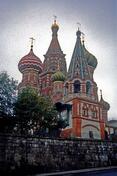
Why the Communists Make War on Religion
by Darian Diachok
March 2019
"Well written chilling account of the early days in Soviet Russia and Stalin's psycho temper tantrums"
- a reader
Communism fell into mortal conflict with conventional Christianity well before the Russian Revolution of 1917. Shortly after Karl Marx published Das Kapital in 1867, four successive popes recognized Communism as an implacable enemy of Christianity.
It wasn’t so much Marx’s call to overthrow civil authority and upend all institutions, like the family, damnable enough in the church’s eyes, but rather Marx’s very denial of the spirit that so alarmed the church. Specifically, the church objected to a materialistic ideology that reduced human beings to cogs serving the state, a state that promised to satisfy all needs, but at the price of dictating all behavior, associations, and forms of expression; the epitome of a devil’s bargain—earthly security at the price of the soul’s freedom.
By contrast, the church promoted the cultivation of independent moral conscience as the path to salvation, a concept Communists dismissed as archaic nonsense. Morality answerable to God? An immortal soul? Eternal salvation? These notions stood squarely in the path of total state control. The individual didn’t answer to some hypothetical God, he answered to the state! Communism was sworn to eliminate whatever stood between itself and its control of the individual, between itself and the paradise it promised in the here and now.
After the Communist Revolution overthrew the centuries-old Romanov dynasty in Russia, the patriarch of the Orthodox Church urged the faithful to resist the revolution’s materialistic philosophy, even unto martyrdom. Stalin, who had once studied and rejected theology in his twenties, immediately responded to this defiance. Confident of an easy victory over organized religion, he authorized the People’s Commissariat for Enlightenment to win over the citizenry through a series of public debates, fully expecting that backward Christian theology—mired, as he believed, in ignorance and medieval superstition—would simply wither when exposed to the light of progressive Marxist thought.
These highly anticipated debates sold out to standing-room-only crowds. But the judgement of the public went contrary to expectations. Orthodox clergy—well schooled in philosophical defenses against a string of heresies throughout church history—not only stood their ground against the Communist side, but made the more persuasive arguments, so much so that the organizers retreated, canceled the debates, and switched to straightforward “lectures on materialism”. Yet so few voluntarily attended that Stalin lost patience and created a new agency to carry on the struggle, the League of the Militant Godless. The league launched a series of five-year plans to reinforce atheism.
Moscow began its war on religion by extending the ban on religious instruction from state to private schools—no teaching of Christian principles in any venue. Responding to widespread protests, the regime countered with a campaign of public ridicule, satirizing feast days and religious rites, with hooligans dressed as bishops and publicly burning sacred books. But such mockery failed to change minds. As if out of frustration, the regime then plundered the churches, chopped out the priceless ancient icons, and sold the country’s religious heritage abroad. Moscow also officially designated the clergy agents of foreign terrorism, a capital crime under Soviet law. The five-year plans then degenerated into wholesale destruction and murder. As the 1930s ended, after the Great Purge had taken its toll, scarcely one in sixty churches remained standing in the USSR, and the Communist Revolution had executed in full two hundred thousand Orthodox clergy, both Ukrainian and Russian.
After two decades of solid experience combatting religion, the Bolsheviks extended their atheistic struggle to western Ukraine, but with a new wrinkle. The NKVD had learned to allow a remnant of the church to keep operating, but under its own control, and to infiltrate the surviving clergy with its own trained agents.
---------------------------------
Darian Diachok has been working in international development for several decades, with major postings in the Former Soviet Union. This piece appears as a chapter in his book, Escapes: A True Story, available on Amazon.